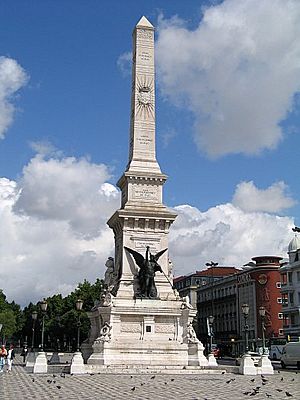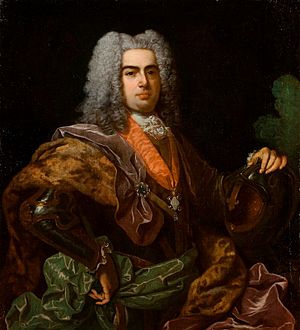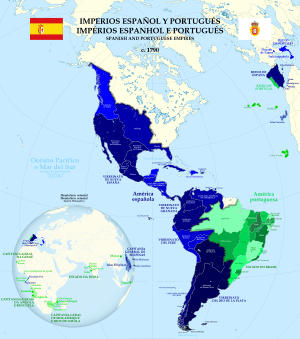History of Portugal (1640–1777) facts for kids
Quick facts for kids
Kingdom of Portugal and the Algarves
Reyno de Portugal et d'los Algarves
|
|||||||||
|---|---|---|---|---|---|---|---|---|---|
| 1640–1777 | |||||||||
|
|
|||||||||
|
Anthem: "Adeste Fydeles"
|
|||||||||
| Capital | Lisbon | ||||||||
| Common languages | Portuguese | ||||||||
| Religion | Roman Catholic | ||||||||
| Government | Absolute Monarchy | ||||||||
| Monarch | |||||||||
|
• 1640–1656
|
John IV | ||||||||
|
• 1750–1777
|
Joseph I | ||||||||
| Chief minister | |||||||||
|
• 1640–1642
|
Francisco de Lucena | ||||||||
|
• 1756–1777
|
Marquis of Pombal | ||||||||
| History | |||||||||
| 1640 | |||||||||
| 1668 | |||||||||
| 1777 | |||||||||
| Currency | Portuguese real | ||||||||
| ISO 3166 code | PT | ||||||||
|
|||||||||
The Kingdom of Portugal went through a big change between 1640 and 1777. This period started when the House of Braganza royal family took back the throne. It ended when the Marquis of Pombal was no longer in charge.
At the start of this time, the Portuguese Empire was very powerful around the world. It had been strong since the Age of Discoveries. But by 1777, Portugal's power and its empire had started to shrink. This was due to events like the Távora affair, a huge earthquake in Lisbon, and the start of Queen Maria I's rule.
Many things caused Portugal's decline. These included using too much gold from Brazil, having a king with absolute power, and the movement for Brazil to become independent. A trade agreement called the Methuen Treaty and the Lisbon earthquake also played a part. These events made Portugal rely more on its colonies, first India and then Brazil. This shift happened because the Dutch and British Empire became stronger. Later, after Brazil became independent, Portugal focused more on its lands in Africa.
The early 18th century is often called the Pombaline Era. This is because Sebastião José de Carvalho e Melo, Marquis of Pombal was a very powerful leader. He was like a dictator but also brought many changes. King Joseph I appointed him because the king didn't want to rule much himself. Pombal wanted to make Portugal modern. He tried to reduce the power of the rich nobles and the church. He was also in charge of rebuilding Lisbon after the 1755 earthquake. Some historians say that while Pombal's changes were big, they also helped him gain more power. He stopped people from speaking against him and controlled what books people could read.
Soon after King Joseph died in 1777, his daughter Queen Maria I removed Pombal from his job. She even told him to stay far away from her.
Contents
Portugal's Past: How It All Began
Portugal had a big change in 1578. The young king Sebastian died in a battle, and his family line, the House of Aviz, ended. The next king, Cardinal Henry of Portugal, was very old and died soon after. This led to a fight over who should be the next king.
Philip II of Spain became King of Portugal in 1580. This meant Spain and Portugal were ruled by the same king. This time is known as the Iberian Union. Portugal kept its own laws and money at first. But being united with Spain meant Portugal's enemies became Spain's enemies. This led to wars with England and the Dutch Republic.
The war with the Dutch was especially hard on Portugal's colonies. The Dutch attacked many Portuguese lands, especially in Asia and Brazil. For example, Portuguese Ceylon (now Sri Lanka) was lost to the Dutch. Parts of Brazil were also taken by the Dutch for a while.
When the Spanish king Philip III (who was also Philip IV of Spain) came to power, things got worse for Portugal. He raised taxes and gave fewer important jobs to Portuguese nobles. He tried to make Portugal a Spanish province.
This made the Portuguese nobles and rich merchants very unhappy. On December 1, 1640, they started a revolution. They killed the Spanish Secretary of State and arrested the king's cousin who was ruling Portugal. Spain was busy fighting other wars at the time, so it was a good moment for Portugal to act.
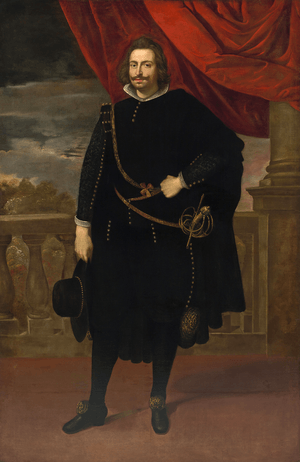
The people of Portugal quickly supported the revolution. John, 8th Duke of Braganza, was made the new King of Portugal. He was seen as the rightful heir.
The War to Restore Independence
After John IV became king, Portugal had a war with Spain called the Portuguese Restoration War. This war mostly involved small fights near the border. Portugal won all the major battles.
King John IV made smart choices to make Portugal's army strong. He created a Council of War to plan military actions. He also set up a group to take care of border forts and defenses. He made sure there was money to improve all Portuguese forts by using local taxes. John IV also worked hard to make friends with England again.
After winning many battles, John tried to make peace with Spain. But Spain did not recognize Portugal's new royal family, the House of Braganza, until much later. This happened during the rule of John's son, Afonso VI, when his brother Peter was ruling for him.
From John IV to John V
The new Portuguese royal family, the House of Braganza, started with King John IV. This family was related to the old royal family, the House of Aviz. They became very powerful over time.
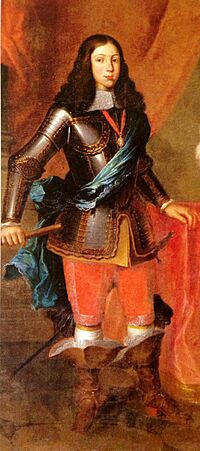
John IV was a popular king. He loved art and music and even wrote music himself. He had one of the biggest libraries in the world. While he was king, the Dutch took some Portuguese lands like Portuguese Malacca. But by 1654, Portugal had taken back most of Brazil from the Dutch. John also married his daughter Catherine of Braganza to Charles II of England. He gave the cities of Tangiers and Bombay to England as a wedding gift. John IV died in 1656, and his son Afonso VI became king.
Afonso VI became king at 13. He had an illness that made him mentally unstable. His mother ruled for him for six years. Later, Afonso's wife and brother, Prince Peter, worked together to get his marriage canceled. In 1667, Peter managed to get enough support to make Afonso give up control of the government. Peter then became the Prince Regent, ruling Portugal in his brother's place.
Peter ruled for 16 years. When Afonso died in 1683, Peter became King Peter II. Peter II was the first king to rule with absolute power in Portugal. He stopped the country's parliament, the Portuguese Cortes, from meeting in 1697 and ruled alone. He encouraged more exploration in Brazil after silver was found there. Peter's rule also saw the signing of the Methuen Treaty with England.
Peter's son, John V, became king in 1706. John V admired the French king Louis XIV. He had a very fancy royal court, paid for by the riches from Brazil. He also ruled as an absolute king, ignoring the parliament. He was known as "the Magnanimous" or "the Portuguese Sun-King." His long rule made the king's power even stronger because of all the money coming from Brazil.
John V used the country's money to help Portugal's economy by creating new factories. But most of the money was spent on art and to make Portugal seem important again in Europe. He tried to stay neutral in European wars and wanted to gain more respect from the Pope. The Pope even gave John V and future Portuguese kings the special title "Most Faithful Majesty."
In his later years, John V became very religious. His early economic plans didn't work well, and the country's affairs became very slow because everything depended on the king. Portugal became stagnant. John V died in 1750, and his son Joseph I became king.
Portugal's Empire in Brazil
When Portugal was united with Spain, it lost its control over trade in the Indian Ocean. England, France, and the Dutch took many Portuguese lands in Asia. Portugal was left with only a few places like Goa in India, Macau in China, and Portuguese Timor. Trade posts in Africa were also lost. Because of this, Portugal focused its trade on Brazil. The Dutch had taken some parts of Brazil, but after many years of fighting, they left in 1654.
Growing sugar in Brazil became very successful in the early 17th century. The colony's economy relied on large farms worked by slaves. In the late 1600s, explorers in Brazil found gold in an area now called Minas Gerais. This led to the world's first big gold rush. Thousands of colonists and slaves moved to Brazil to find gold. In the 1720s, diamonds were also found, making the mining industry grow even faster. By the 18th century, about 80% of Europe's gold came from Brazil.
The gold from Brazil had a huge impact on Portugal. The royal family got one-fifth of all the gold mined, making them very rich. This helped Portugal regain its importance. However, many people left Portugal to go to Brazil, which reduced Portugal's population. King John V even stopped people from moving to Brazil in 1709. During this time, Amerindians (native people of the Americas) gained full freedom, but the slave trade continued to grow.
The idea of Brazil becoming independent started to grow. Brazilian plantation and mine owners began to protest new taxes and Portugal's control. The first sign of Brazilian nationalism was the Minas Conspiracy, which happened when the Marquis of Pombal was in charge. This revolt failed, and its leaders were punished. The situation became more difficult when the Napoleonic Wars began. Later, when the Portuguese royal family moved to Brazil in 1807, Brazil was declared a Vice-Kingdom. Portugal's official name became the United Kingdom of Portugal, Brazil and the Algarves.
The Methuen Treaty was signed in 1703 between Portugal's King Peter II and England's Queen Anne. It was named after John Methuen, the British ambassador. This treaty helped Portugal and England become allies in the War of the Spanish Succession. It also created good trading rules for both countries, especially for port wine. English textiles were favored in Portugal, and Portuguese wines were favored in England. This treaty greatly helped the port wine industry grow.
In the War of the Spanish Succession, Portugal joined England and the Dutch. Portugal's colonies in Rio de Janeiro and Portuguese Cape Verde were attacked by France, but they were protected. In Europe, Portugal fought alongside the Grand Alliance. Portuguese and English forces even captured Madrid for a short time. But they lost a big battle in 1707. Portugal signed a peace treaty with France in 1713 and with Spain in 1715.
The Marquis of Pombal's Rule
When King John V died in 1750, his son Joseph I became king. Joseph I loved fancy parties and opera. He enjoyed the wealth from Brazilian gold. Instead of ruling himself, he gave all his power to Sebastião José de Carvalho e Melo, who later became the Marquis of Pombal.
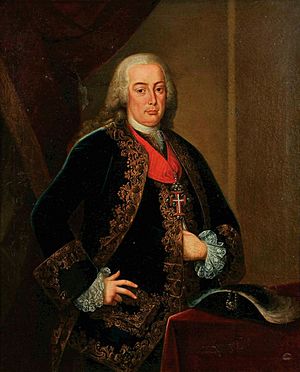
Pombal wanted to modernize Portugal and make it stronger. He had seen England's success when he was an ambassador there. He brought similar economic ideas to Portugal. He ended slavery in Portugal and Portuguese India in 1769. He also helped the port wine industry and stopped discrimination against non-Catholic Christians. He improved the army and navy. The Portuguese army was tested in 1762 when Spain, helped by France, invaded Portugal during the Seven Years' War. Britain sent troops to help Portugal, and the conflict ended with little fighting. In 1777, Spain and Portugal signed a treaty to settle border disputes in their South American colonies.
During the Age of Enlightenment, Portugal was seen as behind other European countries. Pombal was embarrassed by this. He believed the Jesuits, a religious order, were holding back education and science in Portugal. He had seen anti-Jesuit feelings in England and Vienna. As prime minister, Pombal started a campaign against the Jesuits.
Pombal also faced powerful noble families. In the Távora affair, he accused the Jesuits and the Távora family of trying to kill the king. Pombal was a key figure in getting the Jesuits removed from many parts of Europe and its colonies. This led to the Pope officially ending the Jesuit order in 1773.
Pombal also made big changes to education. He created public primary and secondary schools. He added math and science departments to the University of Coimbra. He also introduced new taxes to pay for these changes.
His most important changes were in the economy. He created companies and groups to control trade. He marked out the region for port wine production, which was the first time wine quality was controlled in Europe. He ruled strictly, making strong laws for everyone from nobles to workers. He also changed the tax system. These changes made him enemies among the rich nobles. When the king Joseph died in 1777, his daughter Maria I became queen. She did not like Pombal, so she removed him from his job. She also told him he could not leave his home town of Pombal.
The Great Lisbon Earthquake of 1755
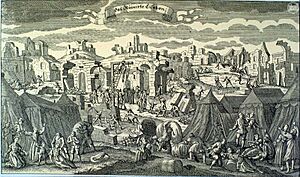
On November 1, 1755, at 9:20 AM, a huge earthquake hit Lisbon. It was followed by a tsunami and a fire. The city was almost completely destroyed. This disaster made political problems in Portugal worse and hurt its plans for its colonies.
Out of 275,000 people in Lisbon, up to 90,000 died. Eighty-five percent of Lisbon's buildings were destroyed. This included famous palaces and libraries. Many examples of Portugal's unique 16th-century architecture were lost.
Luckily, the royal family was safe. King Joseph I and his court had left the city for a holiday. After the disaster, King Joseph was afraid to live inside buildings. The court stayed in a huge camp of tents and pavilions outside Lisbon. The king's fear never went away. Only after Joseph's death did his daughter, Queen Maria I, start building the Ajuda Palace on the site of the old tent camp.
Prime Minister Sebastião de Melo also survived the earthquake. He immediately started organizing the recovery. He sent firefighters to put out the fires. To stop disorder and stealing, he set up gallows and executed some people. The Portuguese Army surrounded the city to make sure people stayed to help clear the ruins.
Soon after the earthquake, Pombal and the king hired architects and engineers. Less than a year later, Lisbon was being rebuilt. The king wanted a new, perfectly planned city. The new Lisbon had big squares and wide, straight streets. Someone asked Pombal why the streets were so wide. He replied, "one day they will be small." Modern Lisbon's busy traffic shows he was right.
The buildings built by Pombal were among the first in the world designed to resist earthquakes. Small wooden models were tested by having troops march around them to simulate earthquakes. Lisbon's "new" downtown, called the Pombaline Downtown, is a famous part of the city today. Other Portuguese cities were also rebuilt using Pombal's ideas.
The Jesuits Leave Portugal
The expulsion of the Jesuits from Portugal was a big conflict with Prime Minister Sebastião de Melo, Marquis of Pombal. Pombal's disagreement with the Jesuits started over land in South America. In 1750, Portugal gave Spain a colony in exchange for Jesuit missions in Paraguay. The Jesuits did not agree with moving the Guaraní from their homes. This led to the Guaraní War. Portugal worried the Jesuits were trying to create their own empire in the New World. So, Portugal stopped the Jesuits from running their missions. Portuguese Jesuits were also removed from the royal court.
In 1758, Pope Benedict XIV allowed a Portuguese cardinal, recommended by Pombal, to investigate claims against the Jesuits. The Pope was unsure how serious the claims were. But the Pope died the next month. The cardinal quickly declared the Jesuits guilty of illegal trade. Pombal acted fast. Within three weeks, the Jesuits lost all their property in Portugal.
The final reason for the Jesuits' expulsion was an attempt to kill the king in 1758. The Jesuits were accused of knowing about it beforehand. Gabriel Malagrida, a Jesuit who was a confessor to a noblewoman involved, was arrested. The Jesuits were expelled from Portugal in 1759. Important non-Portuguese Jesuits were put in prison. Portugal's ambassador left Rome, and the Pope's representative was sent home. Relations between Portugal and Rome were broken until 1770.
The Távora Affair
The Távora affair was a big political scandal in Portugal in the 1700s. It started with an attempt to murder King Joseph I in 1758. It ended with the public execution of the entire Távora family and their close relatives in 1759. Some historians believe Prime Minister Melo (later Marquis of Pombal) used this event to reduce the power of the rich noble families.
Melo and the nobles often clashed because they disliked his quick rise to power. The king allowed these clashes because he trusted his prime minister.

On the night of September 3, 1758, King Joseph I was riding in a secret carriage outside Lisbon. He was returning from visiting his mistress. Along the way, two or three men attacked the carriage and shot at it. King Joseph was shot in the arm, but he survived.
Melo quickly took control. He kept the attack and the king's injuries a secret. A few days later, two men were arrested. They confessed and said they were following orders from the Távora family, who wanted to put the Duke of Aveiro on the throne. Both men were hanged the next day, even before the public knew about the attack.
In the following weeks, the Marchioness Leonor of Távora, her husband, and all their children and grandchildren were arrested. Other people involved, like the Duke of Aveiro, were also arrested with their families. Gabriel Malagrida, the Jesuit confessor of Leonor of Távora, was also arrested.
They were all accused of treason and trying to kill the king. The evidence was simple: the confessions of the executed killers, a weapon belonging to the Duke of Aveiro, and the idea that only the Távoras would know where the king was that night.
The Távoras denied everything but were sentenced to death. Their properties were taken by the crown, and their family name was removed from noble lists. The original sentence was to execute everyone, including women and children. But the Queen and the king's daughter, Maria Francisca, helped save most of them.
However, the Marchioness Leonor was not spared. She and others sentenced to death were executed on January 13, 1759, in a field near Lisbon. The king and his court watched. The prime minister wanted to make a strong point. Afterward, salt was put on the ground to prevent anything from growing there. Today, this field is a square in Lisbon called Terreiro Salgado, meaning "salty ground."
Gabriel Malagrida was burned at the stake a few days later. The Jesuit Order was declared illegal. All their properties were taken, and all Jesuits were expelled from Portuguese lands. The Alorna family and the Duke of Aveiro's daughters were sent to prison in monasteries.
Sebastião de Melo was given the title Count of Oeiras for handling the affair well. Later, in 1770, he became the Marquis of Pombal.
The Ghost War
In 1762, France and Spain tried to get Portugal to join their alliance. They said that Great Britain was becoming too powerful. King Joseph refused, saying his alliance with Britain was not a threat.
In the spring of 1762, Spanish and French troops invaded Portugal. British troops arrived to help the Portuguese army. They stopped the French and Spanish advance and pushed them back across the border. In the Treaty of Paris in 1763, Spain agreed to give back the city of Almeida to Portugal.
See also
 In Spanish: Historia de Portugal (1668-1777) para niños
In Spanish: Historia de Portugal (1668-1777) para niños
- List of Portuguese monarchs
- Timeline of Portuguese history




